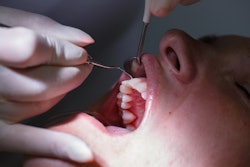Root canal treatment may lower inflammation associated with developing heart disease and reduce the risk of getting diabetes by improving blood sugar and cholesterol levels, according to a press release from King’s College London.
Furthermore, monitoring metabolic markers and protein levels may help track recovery and estimate one’s risk after dental treatment, according to the release dated November 17.
“Long-standing root canal infections can allow bacteria to enter the bloodstream, trigger inflammation, and increase blood glucose and fats levels – raising the risk of serious health issues like heart disease and diabetes,” said Dr. Sadia Niazi, PhD, senior clinical lecturer in endodontology at the university and lead author of a study investigating the link.
Apical periodontitis can allow bacteria to enter the bloodstream and increase inflammation, which is linked to heart problems and difficulties managing blood sugar. However, research on how successful root canal treatment affects heart and metabolic health is limited.
The study followed 65 patients for two years after root canal procedures. Researchers analyzed molecules in the patients’ blood to understand how their bodies handled sugar, fats, and other important substances. Also, they examined how the body responded to both disease and treatment, according to the release.
The team used nuclear magnetic resonance spectroscopy to study proteins and other markers in the bloodstream. Findings showed that tracking metabolic markers such as glucose, triglycerides, and tryptophan may assist in evaluating recovery after dental treatment.
Successful root canal therapy was linked to better glucose control. It also showed short-term improvements in cholesterol and fatty acids. Additionally, inflammation markers decreased over time, and oral bacteria from infected teeth were connected to changes in overall metabolism, according to the release.
The study offers a better understanding of how oral care may help support overall health. However, larger studies are needed to confirm these findings.
“It is vital that dental professionals recognise the wider impact of these root canal infections and advocate for early diagnosis and treatment,” Niazi said.




















